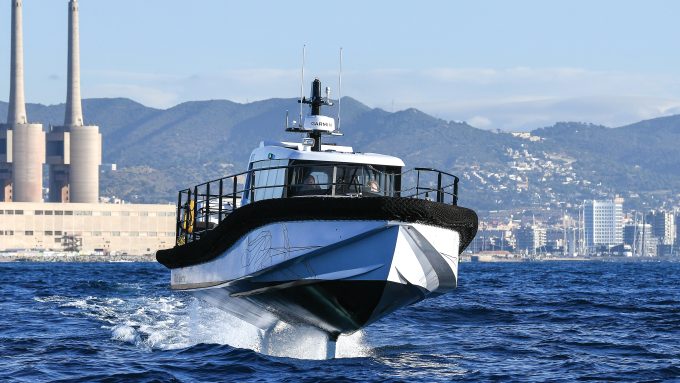
Maritime innovators chosen for accelerator pilots

Two innovative companies delivering new environmental and security concepts for ports have been selected to trial their systems as part of Connected Places Catapult’s Maritime Accelerator programme.
They are Geospatial Insight, which combines data analytics with satellite imagery to help maritime clients monitor air quality and greenhouse gas (GHG) emissions, and Unmanned Life which has developed a software platform known as U-Security that deploys autonomous drones for security surveillance at port facilities.
£60,000 of funding has been allocated to support both trials. The pair of selected companies were part of a cohort of six small and medium-sized enterprises (SMEs) shortlisted by the Maritime Accelerator last summer.
Geospatial Insight is deploying a greenhouse gas emissions monitoring trial for the Portsmouth area, working in partnership with Connected Places Catapult and Serco. Using geospatial and satellite technology, the trial will create an air quality baseline for the port and dockyard area.
The system will integrate ship movements, port activity, industrial sites, traffic movement and atmospheric measurements to deliver the baseline showing key GHG emission and concentration levels for the area, to support net-zero strategies.
“We are extremely pleased to be working with Serco and Connected Places Catapult as strategic partners on this GHG monitoring trial for the Portsmouth area.”Geospatial Insight’s Business Development Consultant – Climate Solutions, Dr Andy Wells
Mike Hayes, Serco UK & Europe’s Transformation and Programmes Director for Defence, added: “Serco’s purpose is to impact a better future by bringing the right people, the right technology, and the right partners to deliver a positive impact. We are therefore thrilled to be supporting Geospatial Insight and Connected Places Catapult to develop a greenhouse gas (GHG) emission baseline for the Portsmouth area through the use of geospatial satellite technology.”
The second SME to begin trials is Unmanned Life, which recognises that ports are complex environments, and that constant security and monitoring can be a daunting task. It says that CCTV and other traditional surveillance tools are constrained by blind spots, limited range and manual errors.
To solve this, the company has developed U-Security, a product designed to deploy autonomous drones for industrial environments. With features including onboard 5G connectivity, thermal imaging and AI decision-making, the product delivers real-time, remote monitoring capabilities, deployed through a simple user interface.
This trial involves Port of Tyne, Unmanned Life, Connected Places Catapult, BT and Ericsson and aims to bring these technologies together to demonstrate greater efficiency in safety and inspection tasks in port environments.
Nicholas Zylberglajt, CEO of Unmanned Life, said: “We are very glad to continue pushing the boundaries of autonomous drone operations in ports, as technology should be the cornerstone to achieve globally competitive UK ports.
“Unmanned Life software will test swift and remote execution of security, inspection and worker safety tasks in the Port of Tyne. Addressing real-world challenges and enhancing operational efficiency will be the key objectives of this deployment, with a view to deploying full autonomous robotics operations in ports in the near future.”Nicholas Zylberglajt, CEO of Unmanned Life
Port of Tyne’s Head of Innovation and Technology, Ian Blake said: “We are excited about collaborating with Unmanned Life as part of this Accelerator programme with Connected Places Catapult. Through our 2050 Innovation Hub and making use of the first site wide private 5G network in a UK port, we are always exploring ways to embrace new technology to supplement the work undertaken by our amazing colleagues.
“We see drone usage as an integral part of our Smart Port strategy to aid optimisation of operations and drive efficiencies across the business. We are thrilled to explore the potential of this opportunity and looking forward to sharing the outputs with our network.”
The companies shortlisted for Connected Places Catapult’s Maritime Accelerator last summer were asked to develop technologies that respond to challenges in the sector around automation and decarbonisation. Areas of focus were identified by programme partners DP World Southampton; Houlder; Maersk; the National Shipbuilding Office; Port of Tyne; Portsmouth International Port; Serco and the University of Plymouth. Partners have been joined by the Royal Navy, which agreed to provide support to SMEs on the Accelerator.
The shortlisted companies received bespoke business development, investment readiness and technical support from Connected Places Catapult. They also gained access to expertise and insights from the programme partners, and had an opportunity to explore and design trials with them, funded through the Accelerator where applicable.





